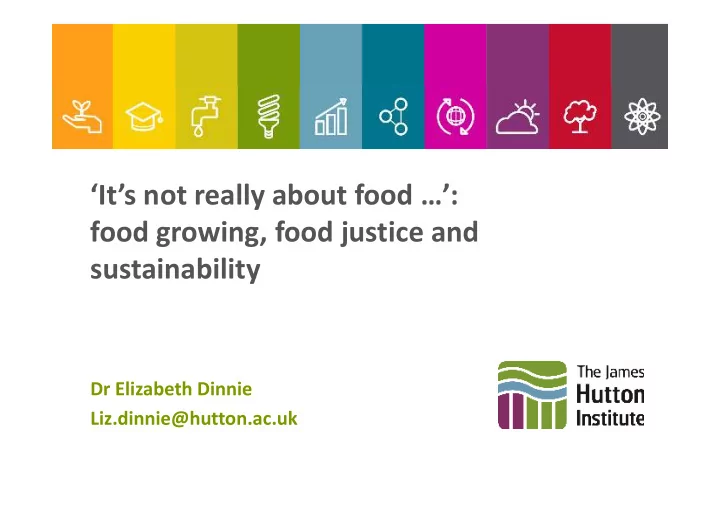

‘It’s not really about food …’: food growing, food justice and sustainability Dr Elizabeth Dinnie Liz.dinnie@hutton.ac.uk
Food growing and food security at individual/household level Food growing has multiple benefits But can it contribute to food justice?
Increasing concern with HH food security and food poverty in food secure countries Public and policy unease over foodbank use
Which local/community food growers? Non-commercial food growers On allotments and community gardens Rural and urban Scotland/UK 2017 Semi-structured interviews with food growers about their motivations for growing (n=29)
Motivations & benefits of food growing Are closely related Multiple motivations Environment and health mentioned most often Social and economic reasons given less importance Family background important Access to fresh food & wider choice only mentioned by a few
Challenges and barriers Access to land, tools & water Rules and regulations Cultural norms that have developed around packaging and presentation of food Learning to manage pests and diseases
Engagement with others Mixed response Some growers were keen to engage with other community groups Many felt they lacked skills to do so Difficulty in getting groups to come to allotment - e.g. health and safety issues for schools and vulnerable adults
Enhancing HH food security? Yes – for those who are already growing Less evidence for link with addressing food poverty/accessing foodbanks Few policy mechanisms linking food growing with other social policy and welfare issues Community food hubs one way to include food growing in enhancing food security for those most at risk of dropping into food poverty
Conclusions Food growing is increasing There is increasing concern over food poverty and food safety Food growing is not a suitable strategy for tackling food poverty due to high start up costs and time/space needed Food growing could contribute to a local food system to tackle food insecurity, through e.g. providing local outlets to sell produce
Recommend
More recommend